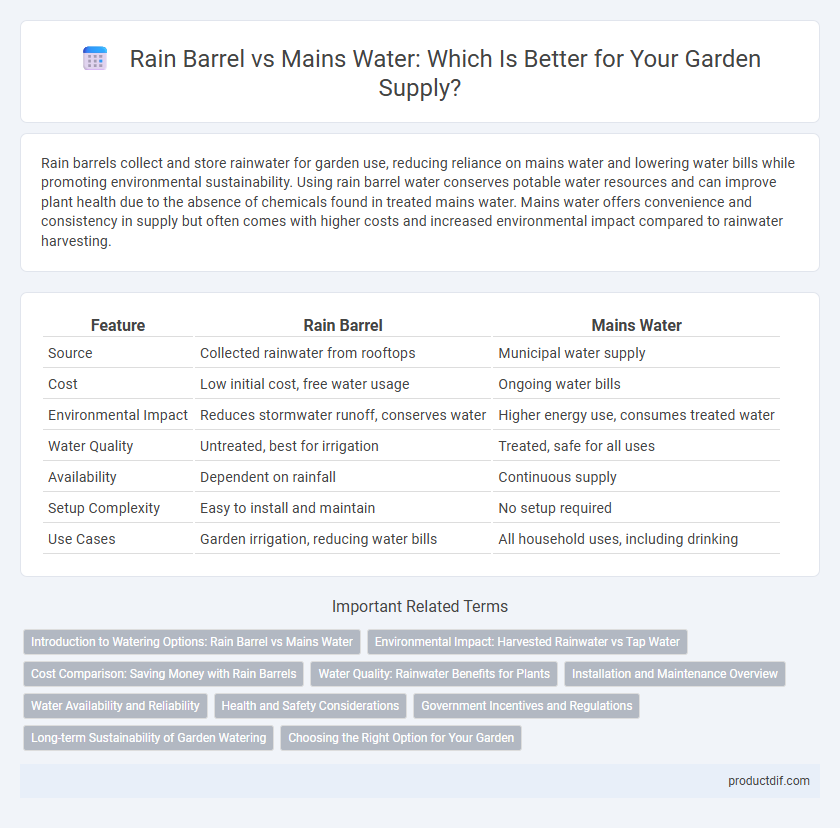Rain barrels collect and store rainwater for garden use, reducing reliance on mains water and lowering water bills while promoting environmental sustainability. Using rain barrel water conserves potable water resources and can improve plant health due to the absence of chemicals found in treated mains water. Mains water offers convenience and consistency in supply but often comes with higher costs and increased environmental impact compared to rainwater harvesting.
Table of Comparison
| Feature | Rain Barrel | Mains Water |
|---|---|---|
| Source | Collected rainwater from rooftops | Municipal water supply |
| Cost | Low initial cost, free water usage | Ongoing water bills |
| Environmental Impact | Reduces stormwater runoff, conserves water | Higher energy use, consumes treated water |
| Water Quality | Untreated, best for irrigation | Treated, safe for all uses |
| Availability | Dependent on rainfall | Continuous supply |
| Setup Complexity | Easy to install and maintain | No setup required |
| Use Cases | Garden irrigation, reducing water bills | All household uses, including drinking |
Introduction to Watering Options: Rain Barrel vs Mains Water
Rain barrels collect and store rainwater from rooftops, offering an eco-friendly alternative to mains water for garden irrigation. Utilizing rainwater reduces demand on municipal water supplies and minimizes utility costs while providing plants with naturally soft, chlorine-free water. In contrast, mains water provides a consistent, readily available source but often contains chemicals that may affect soil health and plant growth over time.
Environmental Impact: Harvested Rainwater vs Tap Water
Harvested rainwater significantly reduces environmental impact by conserving potable water and decreasing demand on municipal supply systems. Using rain barrels lowers energy consumption associated with treating and transporting tap water, minimizing carbon emissions. This sustainable practice also helps mitigate stormwater runoff, reducing pollution and soil erosion in urban areas.
Cost Comparison: Saving Money with Rain Barrels
Rain barrels offer significant savings by reducing reliance on mains water, which can be costly due to high utility rates and metering fees. Collecting rainwater is a free, sustainable resource that lowers monthly water bills and reduces demand on municipal supply systems. Over time, investing in a rain barrel can recoup initial costs through consistent savings on water expenses for garden irrigation.
Water Quality: Rainwater Benefits for Plants
Rainwater collected in barrels is naturally soft and free from chlorine, fluoride, and other chemicals commonly found in mains water, promoting healthier plant growth. Its slightly acidic pH helps improve soil nutrient availability and microbial activity, enhancing overall garden vitality. Using rainwater reduces the risk of chemical buildup in the soil, leading to more robust and resilient plants.
Installation and Maintenance Overview
Rain barrels require straightforward installation, typically connecting to downspouts with minimal tools and no need for plumbing expertise. Maintenance involves regular cleaning of gutters and barrel filters to prevent debris buildup, algae growth, and mosquito breeding. Mains water systems demand professional installation with secure plumbing connections and periodic inspection for leaks and pressure regulation to ensure efficient irrigation.
Water Availability and Reliability
Rain barrels provide a sustainable water source by collecting and storing rainwater, ensuring availability even during water restrictions or droughts. Mains water offers consistent reliability, delivering treated water on demand regardless of weather conditions. Utilizing rain barrels reduces dependency on mains water, promoting conservation and lowering utility costs.
Health and Safety Considerations
Rain barrels provide a natural, chemical-free water source that reduces exposure to chlorine and fluoride found in mains water, promoting healthier plant growth and safer irrigation. Proper maintenance of rain barrels is essential to prevent mosquito breeding and bacterial contamination, ensuring water safety for garden use. Mains water, while treated for human consumption, may contain trace chemicals that can impact sensitive plants and soil ecosystems over time.
Government Incentives and Regulations
Government incentives often favor the use of rain barrels by providing rebates and tax credits to encourage water conservation and reduce reliance on mains water. Regulations may restrict mains water use for outdoor irrigation during drought conditions, making rain barrels a compliant and cost-effective alternative. Utilizing a rain barrel not only aligns with environmental policies but can also lower water bills by supplementing mains water supply.
Long-term Sustainability of Garden Watering
Rain barrels offer a sustainable alternative to mains water by harvesting and storing rainwater, which reduces dependence on municipal water supplies and lowers utility bills. Utilizing rainwater conserves natural resources and decreases the environmental impact associated with water treatment and distribution. Over time, integrating rain barrels into garden watering practices enhances water resilience, promoting eco-friendly landscaping and long-term water sustainability.
Choosing the Right Option for Your Garden
Rain barrels provide an eco-friendly solution by collecting and storing rainwater, reducing reliance on mains water while lowering utility bills and conserving resources. Mains water offers consistent availability and regulated quality, essential for ensuring plants receive adequate hydration during dry spells or in areas with unreliable rainfall. Selecting between rain barrels and mains water depends on garden size, local climate, and water needs, with rain barrels being ideal for sustainable gardening and mains water ensuring reliability.
Rain barrel vs Mains water Infographic

 productdif.com
productdif.com